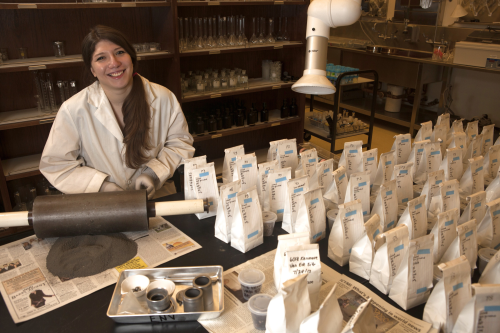Jun 06, 2014
Environmental science graduate connects soil and social justice
Environmental science graduate connects soil and social justice
As a budding scientist growing up on the North Side of Chicago, Katy Rico didn’t have to look far to find a strong role model. “My grandmother was a science teacher at my grade school,” Rico said. “She had a huge influence on me, making me excited about science and the world around me.”
Rico is a 2013-14 graduate of DePaul University’s College of Science and Health, which will celebrate commencement June 15.
As a freshman at DePaul, Rico began the environmental science program and knew right away it was a good fit. “Everything that I learned, I loved,” she said.
When it came time to select a project for her senior thesis, Rico chose to work with associate professor James Montgomery, whose research is focused on wetlands and examining soil, water and vegetation.
“When I first met Monty, I was kind of intimidated,” Rico said. “The idea of doing research was a little daunting, and I didn’t know what to expect.”
Once she got started working in the lab, however, her curiosity won over her nerves. “I thought that soil was so interesting. It’s something that people don’t think about. People call it dirt, which is actually an incorrect term to use.”
Rico went on to spend two years researching soil from the wetland and found that she enjoyed the discipline required when working in a lab.
In addition to her thesis research, Rico was a member of a team that competed at the Environmental Protection Agency’s People, Prosperity and the Planet competition in Washington, D.C., this April. For their project, the team worked for months in Chicago’s Greater Grand Crossing neighborhood, enlisting local teens from the Gary Comer Youth Center to assess soil in the area. The team then created maps of the results, which showed where the neighborhood could host green infrastructure like a garden or wetland. “We tried to get the community as involved as possible,” Rico said. The team received an honorable mention for its work at the competition.
Rico commuted from home throughout college, but she found ample opportunities to engage with student life at DePaul. She was active in DePaul’s chapter of the Society for the Advancement of Hispanics/Chicanos and Native Americans in Science, which encourages minorities to pursue careers in the sciences. She traveled to the national SACNAS conference three times, which urged her on in her studies.
“At times when you’re really concerned about completing an application for a scholarships or writing a cover letter for an internship, SACNAS is a great community to have behind you, supporting you, to make sure you’re still eager about the sciences and wanting to continue. It’s very motivating.”
She also found deep connections between her studies and DePaul’s mission. “Part of the Vincentian values is social justice, and a huge component of social justice is environmentalism. There are so many different eco-groups on campus that are working to spread environmental awareness to the DePaul community and beyond. I think it’s really reflective of our Vincentian values.”
This fall, Rico plans to begin a doctoral program in earth and environmental science at the University of Michigan in Ann Arbor. By continuing on in academia, Rico hopes to give back to other students. “I want to teach people who really want to learn,” she said.
When Rico learned she was accepted into the graduate program, her grandmother was one of the first people she called. “She’s so excited for me to be going into a Ph.D. program as a scientist. She and I have this science connection. It’s automatic that I wanted to tell her, and she gets just as excited about it as I do.”
###

As a budding scientist growing up on the North Side of Chicago, Katy Rico didn’t have to look far to find a strong role model. Her grandmother was a science teacher who sparked an interest in science and the world around her. Rico graduates from DePaul with a bachelor’s degree in environmental science from the College of Science and Health. (Photo by Mark Zalewski)
